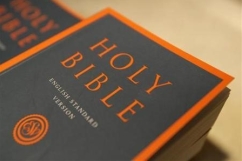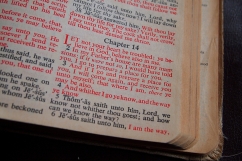
In my role as editor of Preach Magazine, I occasionally get angry letters. Two weeks ago, Mr H wrote in to complain about an article that referred to the siege of Jericho in Joshua 6: "In the world we are now in, we must be much more radical in our approach to the Old Testament," he argued. "Why are Christians so ready to use ghastly Old Testament events, often involving ethnic cleansing, child murder, child sacrifice and massive slaughter to tell people about our 'loving God'?" His letter concluded with the strong recommendation that we distance ourselves (and God) from these stories.
Two days later I had another chap, Mr P, spluttering over the phone with outrage over a piece about Paul's teaching on allegiance to rulers. Mr P is not a fan of the writings of Paul and if he had his way they wouldn't feature in the Good Book at all.
Mr H and Mr P are not alone in their dismay, disgust and embarrassment about our sacred text. Is it time we gave it a good edit? Would it be a good idea to bring it up to date and into line with our enlightened understanding of the principles of diversity, tolerance and hygiene? Are there some passages we can and should disregard as being written by horrible humans, most likely hungover and possibly not entirely mentally healthy when they took up their chisels on that Monday afternoon in 140 BC? Or is every 'jot and tittle' of the 66 books (73 if you are a Catholic) in the canon God-breathed, an eternally relevant and literally true revelation of the divine mind?
There is nothing like a discussion about the Bible to bring out the worst in Christians. We love to come up with labels that make those who hold our position sound good and others sound like idiots with no morals - progressives vs fundamentalists, woolly liberals vs orthodox believers, dogmatists vs radical disciples. We caricature each other's positions in passive aggressive blog posts, and only read books that will reinforce our position. People, this is not good! Jesus specifically asked us to be a community known for the way we love each other.
I am of the 'keep the scissors away from the Bible' school of thought. I'd argue - and probably cry in the middle of my argument because that's how much I hate conflict - that we shouldn't edit the Bible. But I have a few provisos:
God is the only hero
The point of biblical narratives is never that we should blindly emulate the behaviour of any of the protagonists simply because they are in the Bible. Judges 11 tells of Jephthah the mighty warrior who vowed to sacrifice the first thing to leave his house if he defeated the Ammonites, presumably assuming this would be something expendable like a chicken. Unfortunately he won the battle, and more unfortunately it was his daughter who burst out the door to meet him on his return. The point of this story is not to go thou and make stupid vows also.
True doesn't mean literal
The Bible contains many genres - poetry, history, letters, prophecy and so on. We wouldn't read a cook book in the way we read a novel, we don't search the front page of The Times for instructions on how to live, and we wouldn't fight to the death over whether Blake's tiger burning bright was actually combusting.
Always consider the original intent of the text
Historical and geographical context shines light on meaning - we'll read better if we let it illuminate for us. When Jesus talks to the Samaritan woman at the well, it helps to know that Samaritans were descended from the tribes of Ephraim and Manassah but had split from the rest of Israel and intermingled with the peoples around them. Jews considered them sinful and unclean. And it was unusual for a woman to draw water at midday when it was hot. This tells us this woman was a social outcast, and Jesus was flouting convention to talk to her.
'Divinely inspired' doesn't mean God held the pen or dictated the words
The beauty of the Bible is that God has revealed himself in and through his broken, flawed creation. There is mystery here, but only the most arrogant would claim to have understood all there is to understand about God and how he communicates.
If every generation had edited the Bible, adapting it to their perspective on who God is and what values He ought to hold, we would probably be left with something tweetable about love. And I'm sure our grandchildren would have a different take on what love means. So no, we shouldn't edit it.
But we should read it carefully, prayerfully and humbly.
Jo Swinney is an author, speaker and editor of Preach Magazine. She has a Masters in Theology from Regent College, Vancouver, and lives in South West London with her vicar husband and their two little girls.


















